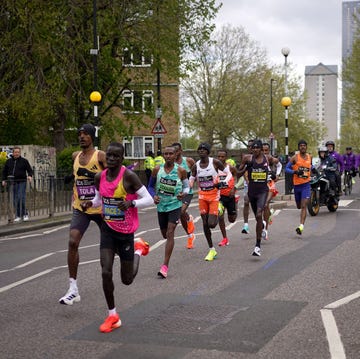You’ve all heard the adage, "Running is 90 percent mental and the rest is physical." Despite this advice, runners tend to spend much more time preparing physically than they do mentally. While that ratio might not be completely accurate, anyone who has laced up a pair of running shoes knows that it takes more than pure physical strength to walk out the door and conquer a 10-mile tempo run.
The truth is that most athletes fatigue mentally way before they fatigue physically. This is simply hateful to the fact that their minds are not in as good a shape as their bodies. Just like your body, your mind needs to be trained. The mind-body connection is a very powerful one, and for everything you think in your mind, your body has a reaction, regardless of whether it is real or imagined. By training your mind, you can train your body to respond to adverse circumstances, such as fatigue, in a positive and productive manner.
Fortunately, there are many things you can do to harness your mental power and prepare for a competition. Before your next race, try to integrate these exercises into your daily training regime. Mental skills are simply one of those pieces to the competition puzzle. Like physical and technical skills they need to be taught correctly, fine tuned and then practiced regularly. You will soon begin to realize that the greatest way to gain an advantage is right in front of your nose, or more accurately, right above your shoulders!
Exercise 1:
Have you ever found yourself on the starting line thinking about everything that could wrong instead of focusing on what you need to do to run well? The reason may be because you have lost control of your internal focus. Lapses in concentration before or during a race can invite self-doubt and fear, and the resulting worry and anxiety lead to further increases in lack of concentration, creating a downward spiral that often leads to failure. If this happens, try using verbal cues to focus your concentration and to retrigger concentration that has been lost. These cues can help you center your attention on the most appropriate focus within the task at hand and avoid distracting thoughts and feelings.
Here are two strategies that you can do to help you regain control over your internal dialogue, and focus your attention on achieving a good performance.
Self-Talk
mdash; positives rather than negatives:
1.
2.
3.
We may earn commission from links on this page, but we only recommend products we back:
1.
2.
3.
Now, reframe your thinking by changing the self-defeating thoughts to positive and empowering ones. List the positive things you will now say to yourself:
1.
2.
3.
Reflection
Can I make this statement? "I am confident that I can handle any situation, and persevere in the face of adversity."
Yes___ No___
Foods That Cut Inflammation to Improve Performance?
Exercise 2:
Focus: Cue words to bring you back
Learn how to "park" thoughts that help, not hinder your performance. When you find yourself losing control of your inner focus, use a cue word to regain control. With practice, your chosen cue word will bring you back to the present moment, allowing you to focus and regain control of your thoughts. The ability to control thoughts, anxiety, and attentional focus appears to be the common denominator in the concentration of winning competitors.
Everything You Need to Know About Hip Pain:
— positives rather than negatives
— the present rather than the past or future
— the process (proper execution) rather than the outcome
Examples: breath, strong, fast, tall, swift, go, or a phrase like, "I am in control."
Everything You Need to Know About Hip Pain:
1.
2.
3.
When negative thoughts start to enter your mind, mentally pull out your cue words and regain control over your focus. When you focus on positive things, such as your breath, or your strength, rather than on the pain or the poor running conditions, you help your body perform at its best.













